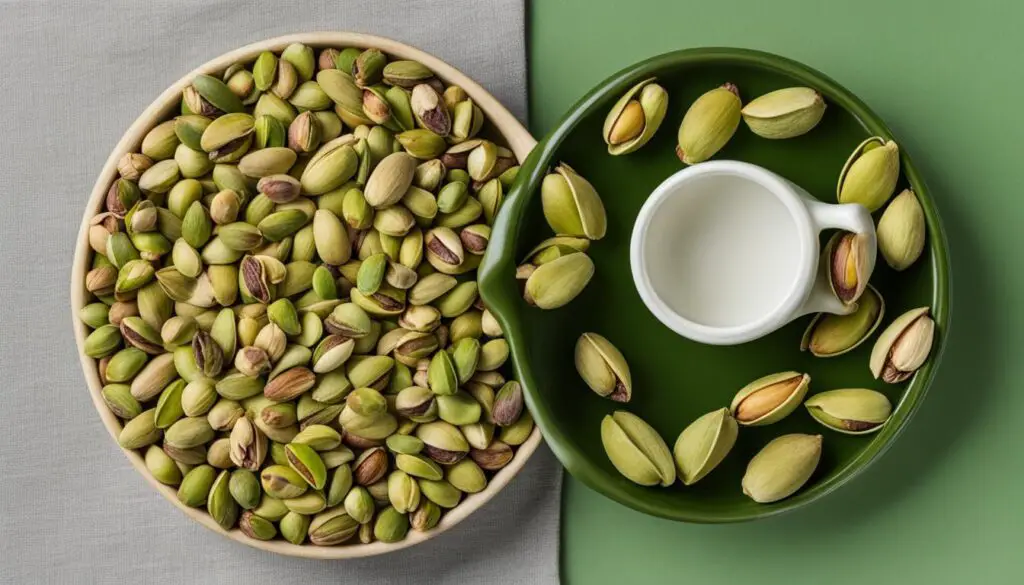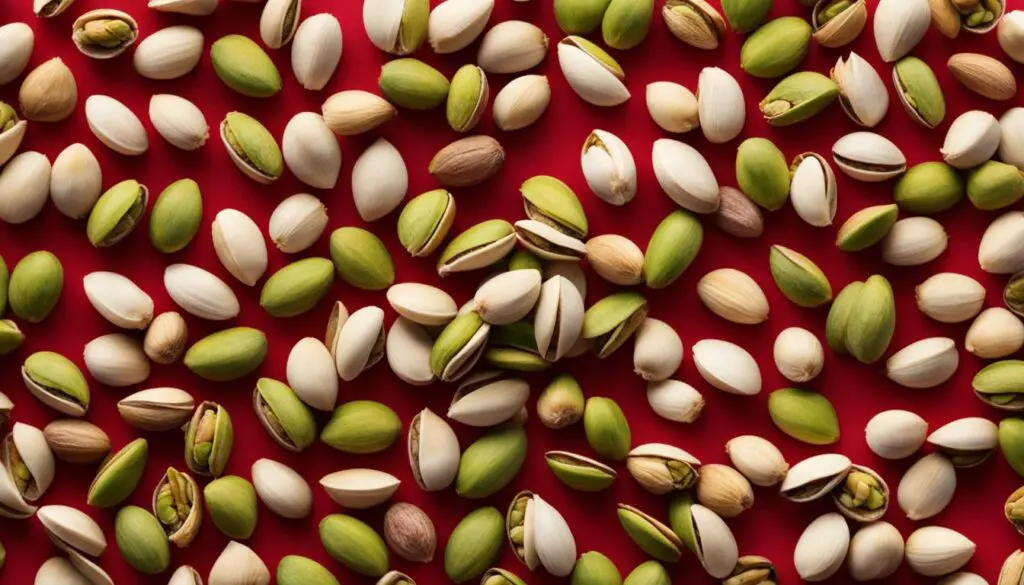Pistachios are a popular nut known for their delicious taste and numerous health benefits. However, you may have heard concerns about pistachios causing constipation or other digestive issues. Let’s explore the truth behind this claim and uncover the facts about pistachios and digestion.
Key Takeaways:
- Pistachios are not typically known to cause constipation.
- The high fiber content in pistachios promotes regular bowel movements.
- Excessive consumption or high fat intake may slow digestion and potentially lead to constipation.
- Pistachios may cause bloating, gas, and other gastrointestinal discomforts in some individuals.
- It’s important to consume pistachios in moderation and be aware of individual sensitivities.
Health Benefits of Pistachios
Pistachios offer various health benefits for digestive health. They are rich in fiber, which supports gut health and regulates digestion.
The fiber content in pistachios helps to add bulk to the stool, promoting regular bowel movements and preventing constipation.
In addition to fiber, pistachios contain beneficial nutrients such as antioxidants, vitamins, and minerals, which contribute to overall digestive health.
However, it’s important to consume pistachios in moderation, as excessive consumption may lead to gastrointestinal discomforts such as bloating and gas. Sensitivity to pistachios can vary from person to person, so it’s essential to listen to your body and adjust your intake accordingly.
Adding pistachios to your diet can provide a tasty and nutritious way to support gastrointestinal health.
Pistachios and Nutritional Value
Pistachios are a powerhouse of essential vitamins and minerals, making them a nutritious addition to your diet. These small, green nuts pack a punch when it comes to their nutrient content. Let’s explore the vitamins and minerals found in pistachios and how they contribute to overall health.
One of the noteworthy vitamins found in pistachios is vitamin B6. This vitamin plays a crucial role in brain development and function, as well as supporting the immune system. Additionally, pistachios contain thiamin, a nutrient that helps metabolize carbohydrates and supports energy production.
In terms of minerals, pistachios are rich in phosphorus, potassium, and copper. Phosphorus is essential for bone health, while potassium plays a vital role in maintaining a healthy heart and normal blood pressure levels. Copper, on the other hand, aids in the formation of red blood cells and connective tissues.
Furthermore, pistachios are an excellent source of dietary fiber. Fiber is essential for digestion and helps maintain a healthy gut. It adds bulk to the stool, preventing constipation, and promotes regular bowel movements.
In summary, pistachios offer a wide range of essential vitamins and minerals, including vitamin B6, thiamin, phosphorus, potassium, and copper. Their high fiber content also supports digestive health. Including pistachios in your diet provides a nutrient-rich boost to overall health and wellbeing.
Nutritional Value of Pistachios
| Nutrient | Amount per 100g |
|---|---|
| Calories | 571 |
| Protein | 20.6g |
| Fat | 45.4g |
| Carbohydrates | 27.2g |
| Fiber | 10.3g |
| Vitamin B6 | 1.7mg |
| Thiamin | 0.9mg |
| Phosphorus | 490mg |
| Potassium | 1030mg |
| Copper | 1.3mg |

Pistachios and Heart Health
Pistachios have long been recognized for their positive impact on heart health. These delicious nuts are packed with essential nutrients that can help reduce the risk of cardiovascular disease.
One of the key contributors to pistachios’ heart health benefits is their high monounsaturated fat content. Monounsaturated fats are known to have a positive effect on cholesterol levels. They help lower the levels of bad cholesterol (LDL) while increasing the levels of good cholesterol (HDL). This balance is crucial for maintaining a healthy heart.
Moreover, pistachios are rich in antioxidants, which play a significant role in cardiovascular health. Antioxidants help reduce inflammation and prevent oxidative stress, both of which are linked to heart disease. By incorporating pistachios into your diet, you can improve your heart health and protect against various heart-related conditions.
Research has shown that regular consumption of pistachios can have a positive impact on blood pressure. Their fiber content supports healthy blood pressure levels by promoting proper blood flow and reducing arterial stiffness. Additionally, pistachios are a good source of potassium, a mineral that helps regulate blood pressure. By adding pistachios to your daily diet, you can naturally manage your blood pressure and lower the risk of hypertension.
To summarize, pistachios are a heart-healthy snack that can contribute to overall cardiovascular well-being. Their high monounsaturated fat content helps reduce bad cholesterol levels, while antioxidants provide protection against heart disease. Additionally, the fiber and potassium in pistachios help maintain healthy blood pressure levels. By including a handful of pistachios in your daily routine, you can make a significant difference in supporting your heart health.

Health Benefits of Pistachios for the Heart:
| Benefits | Explanation |
|---|---|
| Reduced Cholesterol Levels | The monounsaturated fats in pistachios help lower bad cholesterol (LDL) while increasing good cholesterol (HDL), reducing the risk of heart disease. |
| Antioxidant Protection | Pistachios are rich in antioxidants, which reduce inflammation and prevent oxidative stress, promoting cardiovascular health. |
| Healthy Blood Pressure | The fiber and potassium in pistachios support healthy blood pressure levels, reducing the risk of hypertension. |
Pistachios and Weight Management
When it comes to weight management, it may seem counterintuitive to include calorie-dense foods like pistachios in your diet. However, pistachios can actually be beneficial for weight loss due to their unique combination of nutrients.
Pistachios are packed with protein, fiber, and healthy fats, which work together to promote feelings of fullness and help control appetite. Protein and fiber are known to increase satiety, keeping you satisfied for longer periods and reducing the temptation to snack on unhealthy foods. Meanwhile, the healthy fats in pistachios provide a satisfying mouthfeel and contribute to overall satiety.
Furthermore, pistachios have a lower calorie content compared to other nuts like almonds or cashews. This means you can enjoy a reasonable portion of pistachios without consuming excessive calories. It’s important to note that moderation is key in weight management, as even nutrient-rich foods like pistachios can contribute to weight gain if consumed in excess.
To visualize the calorie content of pistachios, consider the following comparison:
| Calories per 100g | |
|---|---|
| Pistachios | 562 |
| Almonds | 579 |
| Cashews | 553 |
| Walnuts | 654 |
As you can see, pistachios have a comparable calorie content to other popular nuts. So, incorporating pistachios into your weight loss journey can provide you with a flavorful and satisfying snack option without compromising your calorie goals.
Remember, weight management is a holistic approach that involves balancing your overall calorie intake, physical activity level, and the quality of foods you consume. Pistachios can be a valuable addition to a balanced diet, supporting your weight loss efforts while providing essential nutrients.
Conclusion
Pistachios are a versatile and nutritious nut that offer numerous health benefits. Their high fiber content aids in digestion and promotes regular bowel movements, making them unlikely to cause constipation. However, excessive consumption or a diet high in fat can slow digestion and potentially lead to gastrointestinal discomforts. It’s important to consume pistachios in moderation, especially for individuals with sensitive digestive systems.
In addition to supporting digestive health, pistachios are packed with essential nutrients, antioxidants, and heart-healthy fats. These nutrients contribute to overall heart health by reducing bad cholesterol levels, lowering blood pressure, and combating inflammation. Including pistachios as part of a balanced diet can help promote a healthy heart.
Furthermore, pistachios can be beneficial for weight management. Despite being calorie-dense, their combination of protein, fiber, and healthy fats helps promote feelings of fullness and control appetite. By incorporating pistachios into a balanced eating plan, individuals can potentially achieve their weight management goals.
Overall, pistachios are a nutritious and flavorful choice that supports digestive health, heart health, and weight management. Incorporating them into a varied diet is a simple and delicious way to promote overall health and wellbeing.
FAQ
Do pistachios cause constipation?
Pistachios are not typically known to cause constipation. In fact, their high fiber content can promote regular bowel movements. However, excessive consumption or high fat intake may slow digestion and potentially lead to constipation.
Can pistachios cause digestive issues?
Pistachios may cause bloating, gas, and other gastrointestinal discomforts due to their fiber content and fermentable carbohydrates. It’s important to consume pistachios in moderation and be aware of individual sensitivities.
What are the health benefits of pistachios for digestion?
Pistachios are rich in fiber, which supports gut health and regulates digestion. The fiber content helps add bulk to the stool and promote regular bowel movements. Additionally, they contain beneficial nutrients like antioxidants, vitamins, and minerals that contribute to overall digestive health.
What is the nutritional value of pistachios?
Pistachios are nutrient-rich nuts. They contain essential vitamins and minerals such as vitamin B6, thiamin, phosphorus, potassium, and copper. They are also a good source of dietary fiber, which aids in digestion and supports overall gut health.
Can pistachios benefit heart health?
Yes, pistachios have been shown to benefit heart health. They are high in monounsaturated fats, which help reduce bad cholesterol levels and improve heart health. The antioxidants present in pistachios also contribute to cardiovascular health by reducing inflammation and preventing oxidative stress.
Are pistachios good for weight management?
Despite being calorie-dense, pistachios can be beneficial for weight management. They are high in protein, fiber, and healthy fats, which promote feelings of fullness and help control appetite. The combination of nutrients in pistachios can help prevent overeating and aid in weight loss.

